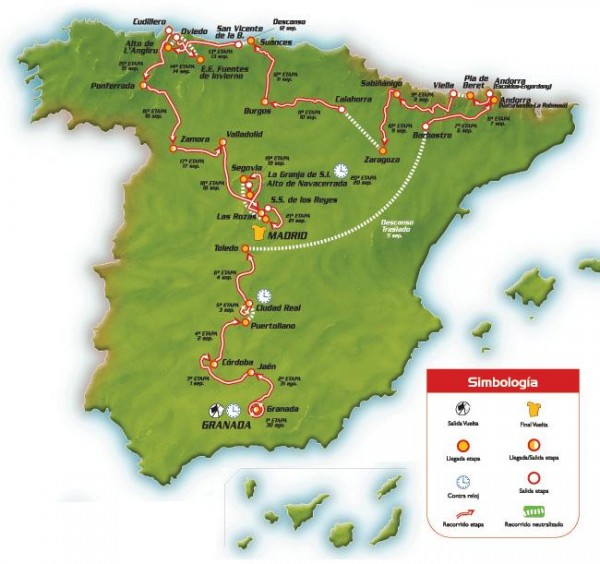Mountains rather than time trials define 2008 Vuelta a España
By Shane Stokes in Madrid The 2008 Vuelta a España looks set to be fought out by climbers rather...

By Shane Stokes in Madrid
The 2008 Vuelta a España looks set to be fought out by climbers rather than time trial specialists due to the nature of the route which was disclosed at the launch in Madrid today. Beginning with a seven kilometre team time trial prologue in Granada on August 30 and concluding in Madrid 3173 kilometres later on September 21, the Grand Tour features eight mountain stages, amongst them a long-awaited return to the gruelling Angliru, one individual time trial of 40 kilometres and one hill-climb TT of 16 kilometres.
Unlike the Giro d'Italia, the climbers have little to fear in the races against the clock and will welcome a route which has been tailor-made for them.
Following the team time trial, the next five stages are mainly flat. The first of these takes the riders 167 kilometres from Granada to Jaén, the second covers 165 kilometres from Jaén to Córdoba and the third travels 153 kilometres from there to Puertollano. Stage five is a 40 kilometre pan-flat individual time trial starting and ending in Ciudad Real, and will be followed the next day by a 162 kilometre stage to Toledo. Each of the road race stages contains just one categorised climb, with stage three's Alto de San Jerónimo (category 2) the most difficult.
A lengthy transfer to Andorra and the first big mountains follows. Friday, September 5 is the first rest day, then the action resumes with three tough days in the Pyrenees. Stage seven covers 224 kilometres from Barbastro to the summit finish of Andorra (Naturlandia - La Rabassa), crossing second, third and first category climbs before the Categoría Especial (hors catégorie) grind up to the line.
The next day sees the riders hit four more climbs along the 160-kilometre route from Andorra towards the second summit finish. The big guns will tussle it out on first, second and first cat ascents before the final Categoría Especial Pla de Beret. The true contenders will be far clearer at this point, and further selections could be made on stage nine from Viella to Sabiñánigo. This 198-kilometre leg is less difficult than the previous two but nevertheless features climbs of third, second, second and first category before the drop down to the finish.
The sprinters and rouleurs should come back into the picture on the next three days, intermediate stages to Zaragoza (173 kilometres), Burgos (178) and Suances (180). The second rest day then takes place, with the riders once again hitting the high climbs on Saturday September 13.
The latest race content, interviews, features, reviews and expert buying guides, direct to your inbox!
The 199 kilometre race from San Vicente de la Barquera to the Alto de L'Angliru will be one of the most decisive of the race thanks to the final climb, one of the toughest in cycling. This is preceded by two category three ascents and two category one mountains, making it certain that there will be a worthy winner at the end of the stage.
Another summit finish follows on the 158 kilometre leg from Oviedo to E. E. Fuentes de Invierno, with the final two climbs being category one. Some respite then follows; stage 15 from Cudillero to Ponferrada is 198 kilometres in length and is lumpy rather than saw-toothed in nature, while the next three stages to Zamora (185 km), Valladolid (160 km) and Las Rozas (179 km) are much flatter.
The general classification is almost certain to be decided on the 19th and 20th stages. The first of these crosses two category one climbs en route to Pedro Delgado's hometown of Segovia, but the flat run in to the finish may prevent big time gaps and allow the sprinters to get back into the picture before the end. However Saturday, September 20's hill climb time trial will certainly be one for the GC men; the 16 kilometres from La Granja de San Ildefonso to the Alto de Navacerrada will settle things once and for all, giving a clear race victor prior to the final processional stage to Madrid.
Apart from climbing, another big theme of the 2008 race will be clean racing. Race director Victor Cordero emphasised as much during the presentation, saying that it was more important than ever to return to a credible sport and thus guarantee the future of cycling.
A full preview and stage details will follow.